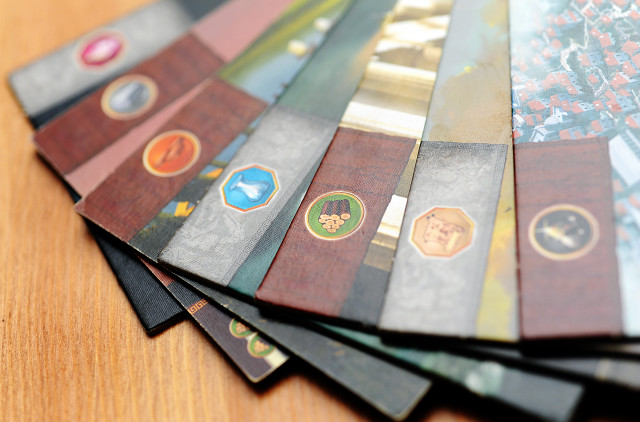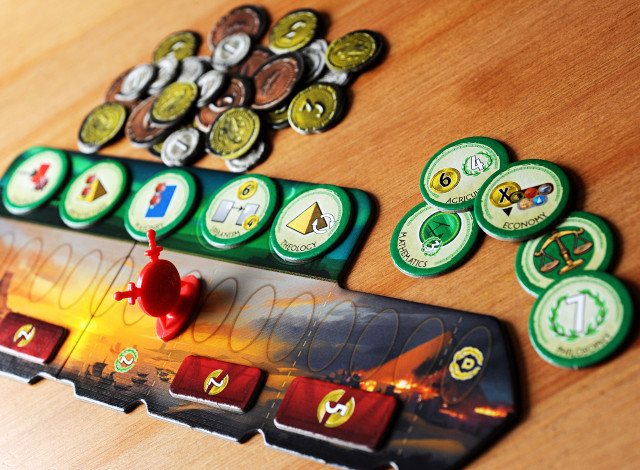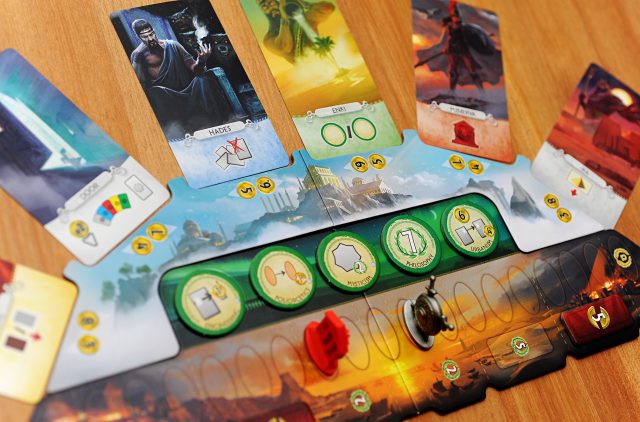The current popularity of tabletop gaming, I believe, is driven by our need for social experiences. People want to meet face-to-face and interact away from screens, have fun, trade wood for sheep, slay some dragons, make naughty Mad Libs, you know, whatever. This would seem to mitigate against the popularity of games which only bring two people together—fewer players, less socializing. There’s also less flexibility, in that other games can accommodate a range of different player counts when people get together, but two-player games can only…well…be played with two (yes, yes, solo variants, shut up).
But, you say, two of the oldest still-popular games in existence, Chess and Go, have massive world-wide followings. Not to mention Magic: the Gathering and all its CCG spawn, which have multiplayer modes, but c’mon how often do you ever see that? MtG tournament play is almost exclusively one-on-one.
I would respond to this excellent point by suggesting that those games serve a different audience, people searching for an intense, head-to-head showdown, you know, “Two approach the table, but only one will walk away.” There are many cultural references to Chess and Go in this vein (see Hikaru no Go and The Seventh Seal for just two examples), and CCG’s have joined the ranks with movies like The Gamers: Hands of Fate (not to mention every single season of Pokémon, ever).
Of the top 10 BGG-rated games, the number which can be played by exactly two players is: two. (Synchronicity?) Sitting at #3 is Twilight Struggle, the epic card-driven history-heavy Cold War saga, still robust after twelve years. And currently at #8, the focus of this article, the little drafting engine that could, 7 Wonders Duel (Duel hereinafter). The next-highest two-player-only game is Android: Netrunner, the highest-placed CCG/LCG game currently on the list at #23. Go is at #103; chess is #393.
By its title Duel implies descent from 2010’s 7 Wonders, and since it has the same designer (Antoine Bauza), graphic design and iconography, and gobs of play mechanics, that implication is justified. 7 Wonders itself sits at #37, and it is a great game—but can it be that this “little” sequel, playable only with two, is the better design?
Yes, it can, and it is. Here’s how.
* * *
7 Wonders takes place over three Ages. Each player represents a Classical-era city. By playing cards representing buildings of various kinds, players build their city’s economy, scientific knowledge, cultural influence, and military power. At the end of the third Age, points are scored in these areas and whoever has the most points wins. Duel follows almost exactly the same template, but with important changes.
 The basic mechanic for both games is card drafting. Instead of receiving randomly-dealt cards or tiles from a deck, players choose them from hands passed around from player to player (i.e., 7 Wonders, Fairy Tale, and pack drafting in MtG) or from a common pool in the middle of the play area (as in Ticket To Ride or, we will see, Duel). Drafting also adds depth to games like Agricola and Terraforming Mars where it helps to mitigate bad luck with card draws and encourages players to make the best use of card interactions.
The basic mechanic for both games is card drafting. Instead of receiving randomly-dealt cards or tiles from a deck, players choose them from hands passed around from player to player (i.e., 7 Wonders, Fairy Tale, and pack drafting in MtG) or from a common pool in the middle of the play area (as in Ticket To Ride or, we will see, Duel). Drafting also adds depth to games like Agricola and Terraforming Mars where it helps to mitigate bad luck with card draws and encourages players to make the best use of card interactions.
Drafting is a great mechanic because it makes for interesting choices every turn—do I want this card because it helps me, or do I want that card because I know Beth wants it and there’s no way I’m gonna let that happen?
One of the reason 7 Wonders is such a great game is that, because there are many paths to victory, there are usually good reasons to choose any given card. All you have to guide you at the start of the game is your City with its unique starting resource and Wonder completion bonuses—but you also need to pay attention to your competitors. Aside from what I said above, about card choices, in 7 Wonders you can “borrow” resources from your immediate neighbours (and vice versa) for your own purposes—but at a price.
Which is one of the other reasons 7 Wonders is a great game—the better you can keep track of your opponents’ progress (particularly your immediate neighbours), the better you will do. This lifts the game from being multi-player solitaire to a richer, more interactive, experience.
7 Wonders scales well from three to seven—and because drafting and playing is simultaneous, it doesn’t take much longer with seven than with three. But its two-player variant is merely okay. It sets up a neutral “Free City” and players alternately draft cards for it as well as themselves. Until Duel came along it was the only way to play with two.
The main reason it doesn’t succeed is that drafting games for two usually suck. Why? Because with two players drafting becomes a zero-sum game; in other words, it is usually much easier to figure out what the best play is because every play that helps you hurts your opponent equally so, and vice versa. All you have to do is pick the option that leads to the best point differential. With three or more players that calculation is much more difficult (at least if the game is any good) because your choices affect two or more opponents differently, which makes simply mathing it out very hard or impossible for most people.
 Not until Tides of Time and its even better sequel Tides of Madness came along did someone (in those cases Kristian Curla) figure out how to deal with that issue while keeping the drafting mechanic basically pure. The interim 7 Wonders two-player version worked but it was clunky, inelegant.
Not until Tides of Time and its even better sequel Tides of Madness came along did someone (in those cases Kristian Curla) figure out how to deal with that issue while keeping the drafting mechanic basically pure. The interim 7 Wonders two-player version worked but it was clunky, inelegant.
Bauza wanted to try something different. He brought Bruno Cathala on board. They knew they needed to keep drafting in the game, but decided to switch from passing cards back and forth to selecting them from a common pool. But how to get rid of the zero-sum problem?
The major part of their genius answer was in the design of the common pool. Instead of a simple line or grid of cards, Bauza and Cathala borrowed from classic solitaire games like Klondike. The cards for each Age are laid out in a tableau, which they call a “structure”, overlapping each other in rows, with roughly half the cards face-down. Players may only pick face-up cards which are totally “uncovered”; face-down cards which become uncovered are immediately turned face-up.
This design decision alone solves 90% of the two-player drafting problem. On the one hand, the face-down cards make it impossible to predict with certainty the consequences of your choices. On the other hand, the domino-like nature of the structures allows for some calculation (“if I take this card, it will uncover that card, which would benefit her, so maybe I should take this other card instead, but oh shit if I do that, then this will happen…”).
 At this point some of you will no doubt have spotted a weakness here in that it can become too easy at times to predict play because players alternate turns…except thanks to another Bauza/Cathala decision, they don’t—not always.
At this point some of you will no doubt have spotted a weakness here in that it can become too easy at times to predict play because players alternate turns…except thanks to another Bauza/Cathala decision, they don’t—not always.
Instead of being able to build only one Wonder over the course of the game, players instead each begin the game with four potential Wonders each. (These are drafted in a more traditional way before the start of Age I.) Each Wonder comes with the usual array of completion bonuses—but with one crucial new possibility. Some Wonders, when built, allow a player to take a second turn right away. In fact, these can be chained, so if you have the right ones, you can build several Wonders in a row on one turn—which is Kraken-level devastating. But even building just one which “flips” the turn order like this can mess up your opponent’s plans, and knowing when to take the initiative this way is a key to success in Duel.
Bauza and Cathala also streamlined the science and military systems and introduced the possibility of Supremacy Victories—ie, sudden death. In regular 7 Wonders it is possible (though not common) to win by ignoring Science or Military (depending on what your opponents are doing); in Duel you definitely cannot afford to do so, because your opponent will simply scoop up those cards and it won’t matter how many VP’s or how much money you’ve saved up, you’ll either be dazzled with Science or your ass will be conquered.
Duel is an ideal two-player game in so many ways. It has essentially limitless replayability because of the Wonder drafting and structure layouts and because, as in 7 Wonders, random cards in each Age are tossed out of the game to start with. It can be played casually, or not, and since a whole game takes 30 minutes (more if one or both of you is AP-prone) you can have a best-of-three match in the time it takes for a single game of, say, Terraforming Mars—but with lots of juicy and involving decisions to make throughout.
I claimed before that Duel is better than 7 Wonders. Given its higher rank on BGG, many agree. Why is that, especially since 7 Wonders expands and collapses effortlessly to many more player counts? The answer lies, I think, in Duel’s “tightness”. It’s toit, like a toiger, taking all the best things from 7 Wonders, distilling them down into the kind of intense yet intimate pas de deux I was talking about at the top of the article.
 If all that wasn’t enough, in 2016 an expansion (Pantheon) came out (also designed by Cathala and Bauza) which adds a whole new layer of gameplay. During Age I players are prompted at certain points to draft Divinity cards (without showing their opponent) from various Mythology decks and place them face down on a new Pantheon Board. At the start of Age II they are turned face-up, and from then on, instead of taking a card from the central structure, a player can pay gold to use the Divinity’s power. This makes it more imperative to save some gold for the start of Age II, because an early invoking of the right Divinity can be a game-changer.
If all that wasn’t enough, in 2016 an expansion (Pantheon) came out (also designed by Cathala and Bauza) which adds a whole new layer of gameplay. During Age I players are prompted at certain points to draft Divinity cards (without showing their opponent) from various Mythology decks and place them face down on a new Pantheon Board. At the start of Age II they are turned face-up, and from then on, instead of taking a card from the central structure, a player can pay gold to use the Divinity’s power. This makes it more imperative to save some gold for the start of Age II, because an early invoking of the right Divinity can be a game-changer.
Admittedly my initial reaction to Pantheon was tepid—I thought the additional mechanics felt a bit bolted-on and ruined the elegant simplicity and flow of the base game. After a whole bunch of plays, though (aided by the excellent and free unofficial online implementation), I am a wholehearted convert. I don’t think new players should incorporate Pantheon until they are comfortable with the base game and (as with 7 Wonders itself) know the cards in the different Ages, which is essential for good strategic play.
I believe 7 Wonders Duel deserves its place as the second-highest rated two-player game. What do you think?
[…] of Shadows Over Camelot and Five Tribes, and co-designer of 7 Wonders Duel (which I wrote about a couple of weeks ago). It was also a clever little game of bidding and city-building, and I liked it a lot. Clearly, so […]
[…] enjoy solitaire games. Despite blathering on a month ago about how tabletop gaming is a social experience, sometimes I just like playing with myself […]
[…] as well, and the reading of these histories coincided with my wife and I falling hard for the game 7 Wonders Duel. While laying the cards and acquiring resources, I would ponder the way societies rise and fall, […]
[…] player than anything else. The base game contains rules for 2 players, but since the release of 7 Wonders Duel couples have a much better option […]
[…] For an in-depth look at 7 Wonders: Duel from when it was released, check out David’s column from 2017. […]
[…] of fame worthy: Cathala is known for co-inventing evergreen titles such as Shadows Over Camelot, 7 Wonders Duel, and Mr. Jack. Pauchon created the delightful Jaipur, as well as older classics such as Yspahan […]